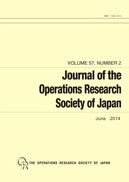
- Issue 4 Pages 203-
- Issue 3 Pages 129-
- Issue 2 Pages 45-
- Issue 1 Pages 1-
- |<
- <
- 1
- >
- >|
-
Tianyang Li, Maiko Shigeno2021Volume 64Issue 1 Pages 1-11
Published: January 31, 2021
Released on J-STAGE: January 31, 2021
JOURNAL FREE ACCESSThe information diffusion game, which is a type of non-cooperative game, models the diffusion process of information in networks for several competitive firms that want to spread their information. Recently, the game on weighted graphs was introduced and pure Nash equilibria for the game were discussed. This paper gives a full characterization of the existence of pure Nash equilibria for the game on weighted cycles and paths according to the number of vertices, the number of players and weight classes.
View full abstractDownload PDF (190K) -
Hiroki Yamada, Tadahiko Sato2021Volume 64Issue 1 Pages 12-30
Published: January 31, 2021
Released on J-STAGE: January 31, 2021
JOURNAL FREE ACCESSThe purpose of this study is to reveal how marketing affects customers' purchase amount and number of visits in Japanese department stores. We model purchase amounts by using a hierarchical Bayes regression model and number of visits by using a hierarchical Bayes Poisson regression model. Furthermore, we estimate the latent factor behind price as the purchase amount per month with a Type-1 Tobit model and the structural heterogeneity of each customer with a model for variable selection. Direct mail and events are used as marketing measures. The analytical results reveal marketing measures that raise customers' final purchase amounts.
View full abstractDownload PDF (1443K) -
Takuro Fukunaga2021Volume 64Issue 1 Pages 31-44
Published: January 31, 2021
Released on J-STAGE: January 31, 2021
JOURNAL FREE ACCESSThe maximum budget allocation (MBA) problem is the problem of allocating items to agents so as to maximize the total payment from all agents, where the payment from an agent is the sum of prices of the items allocated to that agent, capped by the agent's budget. In this study, we consider a generalization of the MBA problem in which each item has a capacity constraint, and present two approximation algorithms for it. The first is a polynomial bicriteria algorithm that is guaranteed to output an allocation producing at least 1−r times the optimal feasible total payment, where r is the maximum ratio of price to budget, and to violate the capacity constraints on items by at most a factor of 2. The other is a pseudo-polynomial algorithm with approximation ratio 1/3·(1−r/4) that always outputs a feasible allocation.
View full abstractDownload PDF (152K)
- |<
- <
- 1
- >
- >|